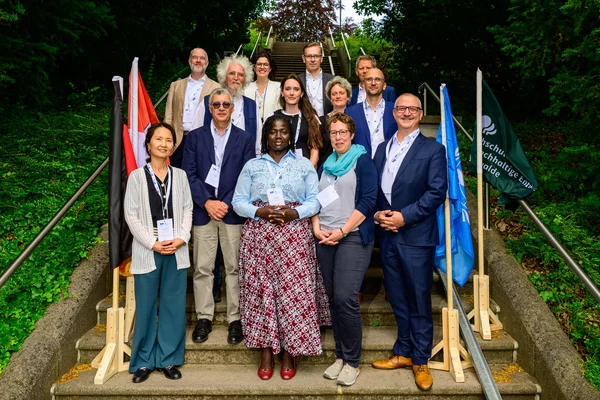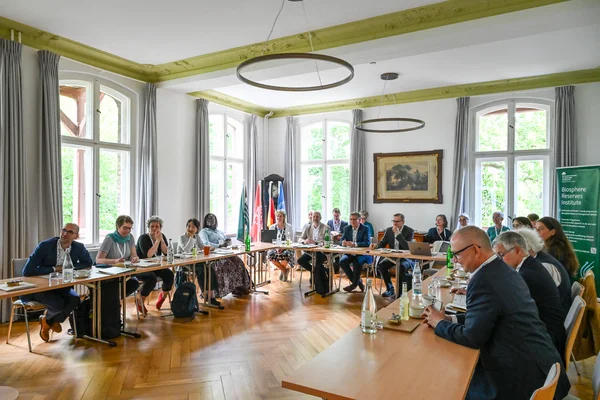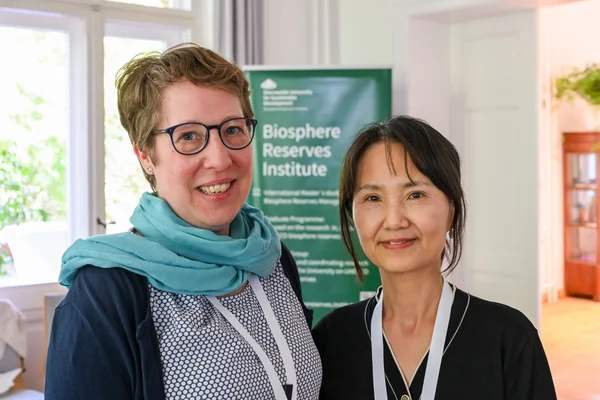Official kick-off: International Supervisory Board of the UNESCO Institute for Biosphere Reserves at HNEE meets for the first time in Eberswalde
With the inaugural meeting of its Supervisory Board on 19 June 2025, the Biosphere Reserves Institute (BRI) at Eberswalde University for Sustainable Development (HNEE) is consolidating its role within the international community of UNESCO biosphere reserves. As a UNESCO Category 2 institute under the auspices of UNESCO, it is the first of its kind in the world with this specific focus. The kick-off meeting marks the next significant milestone one year after the signing of the trilateral agreement in Paris between UNESCO, the Federal Foreign Office and HNEE on 19 June 2024.
The BRI is a member of a global network of privileged UNESCO partners with access to international and intergovernmental bodies. As a think tank on biosphere reserves, it promotes the implementation of the UNESCO programme "Man and the Biosphere" through research, policy advice, knowledge production and educational services. The Institute is actively represented at international conferences and offers excellent academic profiles with the globally unique Master's study programme "Biosphere Reserves Management" and a doctoral college in cooperation with Leuphana University Lüneburg. Research focuses on the impact and significance of biosphere reserves as model regions for sustainable development.
The task of the Supervisory Board is to help shape the strategic direction of the BRI, define milestones, review its independent working methods and ensure that the institute works in line with UNESCO objectives. To ensure continuous evaluation and management of its work, the Supervisory Board meets at least once a year to assess results, adapt strategies where necessary and provide new impetus for international cooperation.
"The first meeting of the Supervisory Board is another important step for our UNESCO Institute. The professional and international expertise that comes together in this committee will help the BRI to further advance international networking and research and development work in and with biosphere reserves," emphasised Prof. Dr Matthias Barth, President of HNEE and member of the committee.
Dr Stefanie Hedtkamp was elected Chairwoman of the Supervisory Board at the constituent meeting. Dr Suk-Kyung Shim was appointed as deputy chairperson. Both are internationally renowned experts in the field of biosphere reserves and UNESCO programmes and stand for strategic foresight and scientific excellence.
Before the official Board meeting began in the afternoon, the members of the Supervisory Board were given a direct insight into regional practice - from sustainable land use to environmental education - during a field trip to the Schorfheide-Chorin Biosphere Reserve.
Composition of the Supervisory Board
In addition to the contractual partners of UNESCO, the Federal Republic of Germany and HNEE, the Supervisory Board includes privileged partners of the BRI and country representatives from Costa Rica, Ghana, Canada and the Republic of Korea:
- UNESCO: Dr António Abreu, Director of the Division of Ecological and Earth Sciences and Coordinator of the World Network of Biosphere Reserves
- German Federal Government: Dr Stefanie Hedtkamp, Head of Division N I 2 "Area Protection, Natura 2000" at the Federal Ministry for the Environment, Climate Protection, Nature Conservation and Nuclear Safety
- German Commission forUNESCO: Dr Lutz Möller, Deputy Secretary General
- Privileged partners: Dr Hannes Knapp (Michael Succow Foundation), Dr Neele Larondelle (National Association of National Natural Landscapes)
- Country representatives: Prof. Dr Maureen Reed (Canada), Sheila Ashong (Ghana), Dr Suk-Kyung Shim (Republic of Korea), Prof. Dr Tania Moreno Ramos (Costa Rica)

Das BRI und ihre Aufsichtsratsmitglieder vor Ort in Eberswalde

Der Aufsichtsrat und alle Mitwirkenden des BRI bei seiner konstituierenden Sitzung am 19. Juni 2025 in Eberswalde.

Dr. Stefanie Hedtkamp (links) und Dr. Suk-Kyung Shim
The first picture shows: The BRI and their Supervisory Board members (1st row from left to right:) Dr Suk-Kyung Shim (Director of the Director of the Institute for Man and Nature, Republic of Korea), Sheila Nana Akua Ashong (Director of Natural Resources at the Environmental Protection Agency in Ghana), Dr Stefanie Hedtkamp (Head of oral report Unit N I 2 "Area Protection, Natura 2000 at the Federal Ministry for the Environment, Climate Protection, Nature Conservation and Nuclear Safety), Dr Lutz Möller (Deputy Secretary-General of the German Commission for UNESCO).| (2nd row from left to right:) Dr António Abreu (Director of the Division of Ecological and Earth Sciences, UNESCO), Josephine Chaffee (Legal Supervisor of Higher Education Institutions at the Ministry of Science, Research and Culture of the State of Brandenburg), Prof. Dr Matthias Barth (President of HNEE) | (3rd row from left to right:) Prof. Dr Hannes Knapp (St. Gallen University of Applied Sciences) Dr Hannes Knapp (Deputy Chairman of the Board of Trustees, Michael Succow Foundation) and Dr Neele Larondelle (Deputy Managing Director, Nationale Naturlandschaften e. V.) | (4th row from left to right:) Prof. Dr Carsten Mann1, Ana Filipa Ferreira (Managing Director of the BRI), Prof. Dr Martin Welp2 and Prof. Dr Jan-Peter Mund3.
1-3 Academic Directors of the BRI